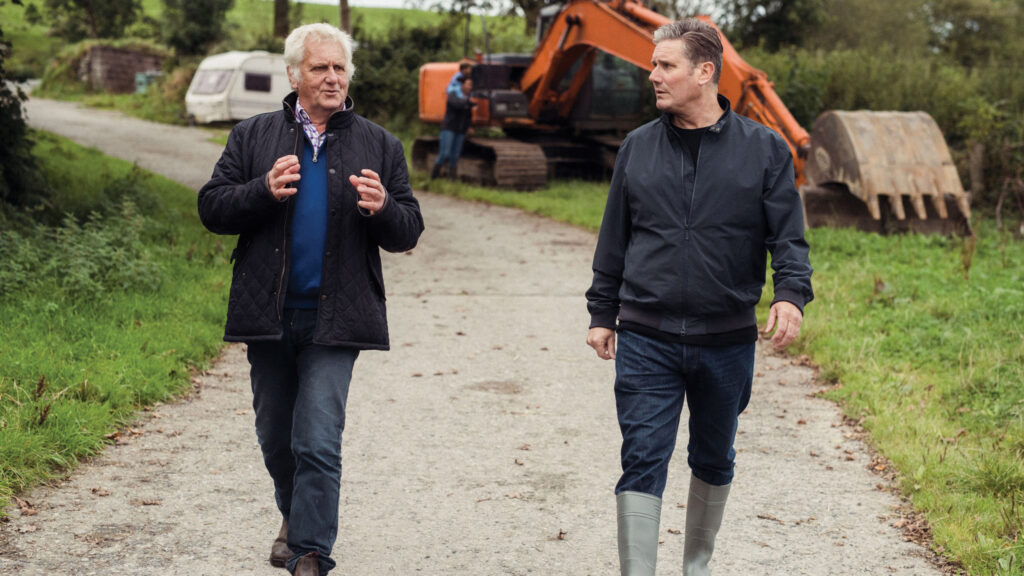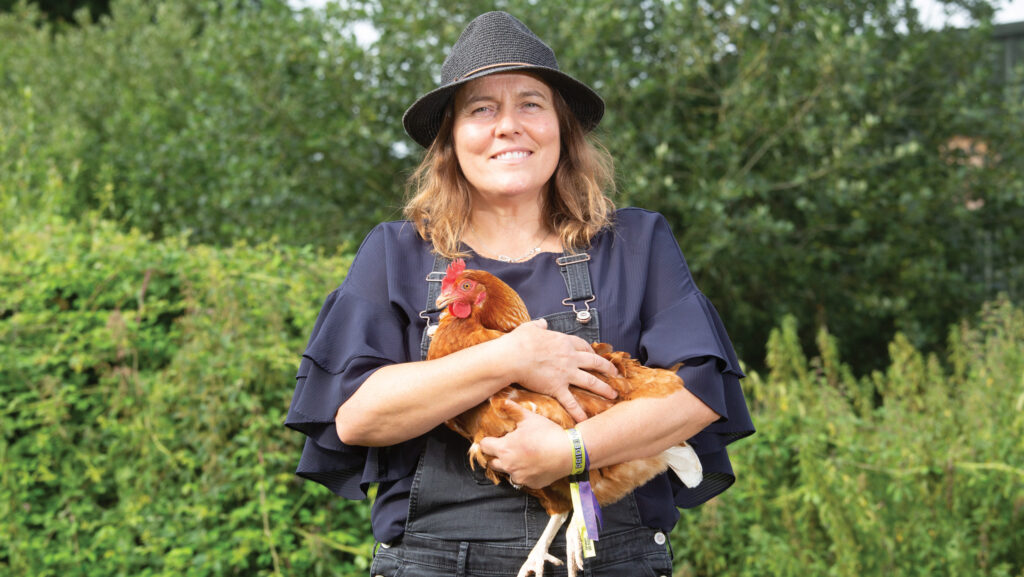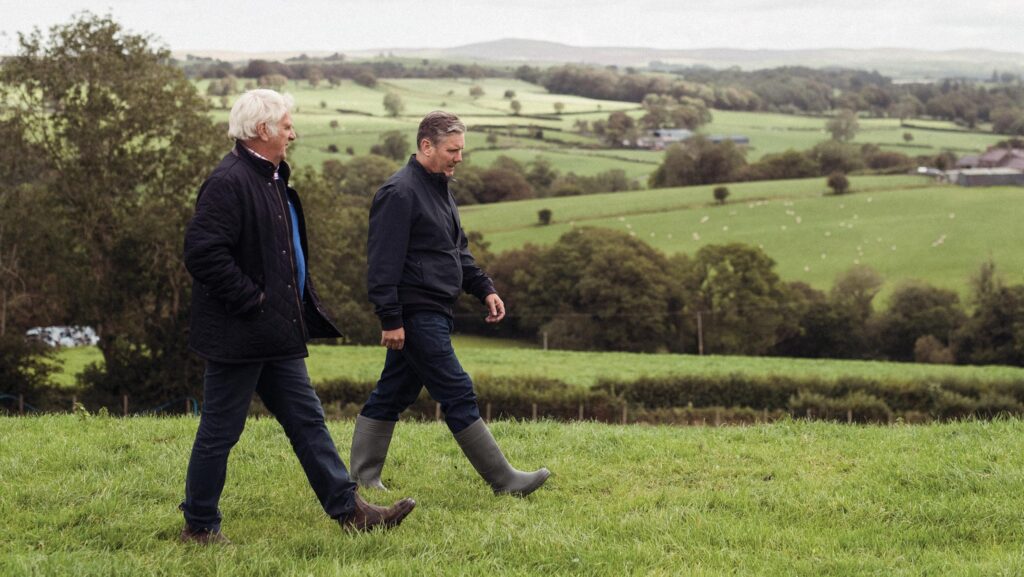How to host MPs on farm and influence ag policy
 © FUW
© FUW With MPs currently enjoying their Easter holidays, now might be the ideal time for farmers to invite them to their farms and showcase the challenges they face, while discussing the impact of recent agricultural policies.
But if you miss this window, there’s another great opportunity to engage with policymakers – Open Farm Sunday on 8 June.
This annual event, where farmers across the country open their doors to the public, offers a unique chance to welcome MPs, councillors, and local decision-makers to see first hand the realities of farming life.
See also: Support on offer for Open Farm Sunday 2025 hosts
Government policies, environmental regulations, and funding schemes are rapidly shifting, making it essential for farmers to raise their concerns and demonstrate the opportunities within British agriculture.
Hosting MPs on farm visits – whether during Open Farm Sunday or at other times – provides a valuable opportunity for them to experience the barriers and possibilities farmers face.
No substitute for hosting
Farm visits help MPs understand the realities of food production, sustainability, and rural businesses. These visits showcase the essential role agriculture plays in supporting local economies and ensuring national food security.
According to NFU president Tom Bradshaw, there is “no substitute for getting decision-makers out on farm”.
7 tips for farmers hosting MPs on farm
- Clarify the purpose Be clear and concise in your invitation, outlining specific issues or topics you want to discuss with your MP.
- Choose the right time Invite MPs on a Friday or during the parliamentary recess when they are more likely to be available in their constituency.
- Plan the visit Provide an agenda and plan for a farm walk and a kitchen table discussion. This helps MPs understand the day-to-day workings of your farm and allows for a deeper conversation on key issues.
- Research your MP Understand your MP’s views and voting record using resources like They Work For You, so you can tailor the conversation to their priorities and influence.
- Keep it focused Be clear, concise, and solution-oriented. Highlight the issue, its importance, your proposed solution, and what you want the MP to do about it.
- Engage their staff MPs often bring staff members who may handle follow-up actions. Ensure you engage with them and establish next steps after the visit.
- Follow-up Ensure the MP agrees to specific follow-up actions, such as writing to a minister or tabling a debate.
Source: NFU
Such visits are the best chance to change policy proposals by giving policymakers a direct understanding of the issues farmers face, Mr Bradshaw notes.
Since the Autumn Budget, the NFU has facilitated nearly 600 meetings with MPs, 20% of which were held on farms.
Mr Bradshaw urges all farmers to “take every opportunity to engage with policymakers, ensuring agriculture remains a priority in political discussions”.
Direct engagement
Farming in the UK is about more than food production; it’s essential for sustaining rural communities, supporting the national economy, and addressing sustainability challenges.
Out of 649 elected MPs, 404 are Labour MPs, of which some 190 hold seats with at least some part of it being rural, 121 are Conservative MPs, 72 are Liberal Democrats, with Plaid Cymru, Reform UK and the Green Party having four MPs each.
Many MPs, however, are based in urban areas and may be disconnected from the realities of farming.
This detachment can lead to decisions that overlook farmers’ struggles.
Inviting MPs and decision-makers to see farms in action provides them with a clearer understanding of the complexities involved in agriculture.
It also reveals the importance of farming beyond what is often portrayed in the media, highlighting agriculture’s vital role in food security, sustainable practices, and rural development.
Farming’s value
A key objective of hosting MPs is to emphasise the economic, environmental, and social value of agriculture.
The sector is grappling with various challenges, such as fluctuating prices, shifting subsidies, changes to farm inheritance tax policy, environmental pressures, and the impacts of climate change.
As a result, farmers must highlight the critical need to sustain a robust and thriving agricultural industry.
Farmer Martin Williams, who regularly hosts MPs and officials from Defra and government agencies on his Herefordshire farm, advises farmers to focus on the bigger picture.
“Think about the key policy message you want to convey and what they’re focused on during their visit,” he says. “Offer solutions, not just problems.”
Mr Williams also encourages farmers to engage with individuals outside of power, particularly around elections and manifestos.
“We spent 14 years under Conservative rule, ignoring Labour, and now they’re in government,” he points out.
He recommends providing input to multiple parties, as it could lead to questions being raised in parliament.
Meanwhile, Mr Williams prefers using WhatsApp to communicate with his local MP, Ellie Chowns, the Green Party representative for North Herefordshire.
He finds it a more direct and reliable method than letters, which can easily be overlooked.
Susie Macmillan, an organic egg producer from Mac’s Farm in Ditchling, East Sussex, has hosted numerous MPs and local councillors over the years, including former Conservative MP for Lewes, Maria Caulfield, and her predecessor, former Liberal Democrat MP Norman Baker.

Susie Macmillan © Tim Scrivener
Mrs Macmillan, a previous Farmers Weekly Poultry Farmer of the Year, emphasises the importance of MPs spending adequate time on the farm and following up after the visit to take tangible action.
She says: “We have real issues that need to be addressed, and change needs to happen.”
Alternative meetings
For farmers unable to host MPs on their farms, arranging face-to-face meetings at constituency offices is an effective alternative.
For example, Ollie Field, a farmer from Pulborough, West Sussex, recently met with his local Labour MP, Peter Kyle, at his constituency office to stress the importance of a thriving farming industry. “We had just half an hour, and it was informal,” says Mr Field.
“I didn’t go in all guns blazing, but I made sure he understood the significance of farming to the UK.”
During the meeting, Mr Field spoke about the need for continued support for agricultural technology grants, highlighting how ag-tech can reduce reliance on chemicals and fertilisers.
To strengthen his case, Mr Field provided Mr Kyle with farming facts and figures, laminated on two A4 sheets.
“I laminated the paper because I thought it was less likely he’d just throw them in the bin,” he explains, demonstrating the value of presenting information in a way that encourages thoughtful consideration.
By proactively engaging with MPs, farmers can ensure their concerns are addressed and help shape policy discussions that prioritise agriculture.
Championing agriculture in rural Wales
Glyn Roberts is a tenant farmer on a National Trust beef and sheep family hill farm in Snowdonia National Park, near Betws-y-Coed.
A first-generation farmer who moved to the farm in 1984, he now works alongside his daughter, Beca Glyn, 31, who has returned to the farm full-time after studying agriculture at university.
Mr Roberts, who served as president of the Farmers’ Union of Wales for eight years until July 2023, has long been an advocate for the value of agriculture in rural communities.
A key part of his approach is engaging with policymakers, and in 2022, he hosted Labour leader Sir Keir Starmer on his farm.
Mr Roberts recalls: “He asked if he could visit us on farm. I believe it is vitally important that we, as the Farmers’ Union of Wales, do everything possible to have a dialogue with our MPs and Senedd members.”

© FUW
During the visit, Mr Roberts showed how they are mitigating climate change, showing Sir Keir their farming practices, such as using less fertiliser, planting trees, and fencing off streams to protect water quality.
A key topic was food production and UK food self-sufficiency, which Mr Roberts describes as “a concerning trend”.
He stresses: “It’s vital that we prioritise local production. Importing more food not only impacts other countries, but also increases emissions.
“By producing more domestically, we can reduce our environmental footprint.”
Mr Roberts is also passionate about agriculture’s role in sustaining rural communities, warning, “without agriculture in rural Wales, there’d be a migration from the countryside, and with it, the loss of the Welsh language”.
While positive about his interaction with Sir Keir, Mr Roberts remains cautious about the future of agriculture under the Westminster government.
“I’m not convinced that the Labour government is giving much priority to the industry,” he says.
But he believes ongoing dialogue with policymakers is key, saying: “The best tool we have is to show them what agriculture is all about.”
